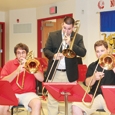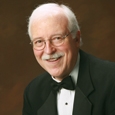Len Lavelle is the director of bands at North Hills High School in Pittsburgh. A 1998 graduate of North Hills, he states that “music was primarily social for me at first, but I liked being part of something bigger than just me, and my senior year, I applied to many different college programs, including music. As the year went on, the choice became clearer for me. By the time I auditioned for colleges in January and February, I knew this is what I wanted to do. There were so many points along the way when I could have taken a different path. Everything I value most in my life – friends, my wife, and my family comes from being in music. That affects how I view my students.”
To get students invested in the program, “we always encourage students to talk more in rehearsal and to be involved in making musical decisions. A great rehearsal environment gives you a chance at learning music. Without it, there are always distractions getting in the way. Each January, we talk to our juniors about their senior year, what they want to give the band, and what they are excited about. I share stories and examples to frame their thinking, but our leadership is based on each senior class getting an opportunity to set the tone for the band.”
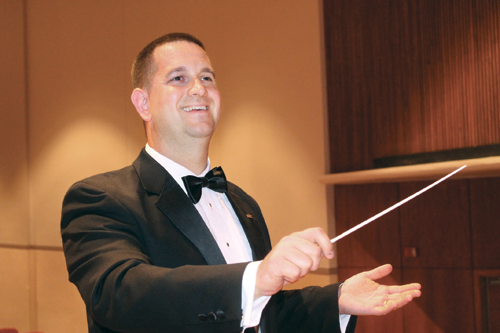
North Hills High School has sustained a lengthy series of commissions by prestigious composers. What is the heritage of this program?
The program began when Warren Mercer came to North Hills in 1961 and commissioned his first work in 1965. It was much earlier in the development of band literature and a big deal to commission works. Warren had a distinguished 30-year career at North Hills, taking bands to Midwest six times and commissioning works every year. When I played in the band as a student, my director, David Matthews, also championed the series. When I became the director at the high school, I pulled out every score from the series and put them right next to my desk in the office. I didn’t want the pieces to be a secret because they are wonderful. We want people to know about the series. We just celebrated our 50th anniversary in 2015 when our wind ensemble gave the premiere of Michael Daugherty’s Winter Dreams. Our most recent was our 51st piece by Julie Giroux.
Making commissions happen ever year takes considerable effort. When I first arrived at the high school, I spent that summer making calls to composers, who were great at helping me learn the process. We are always thinking about possible composers to commission. Sometimes the composers have a backlog, and we have to wait two or three years. We find composers with shorter waits to fill the gaps.
Each composer has different requirements for the contract and payment. We talk about instrumentation, which for us is pretty standard. Composers usually ask about the strength of our sections and potential soloists. We will discuss length because that is closely tied to cost. Because we are a single school, not part of a consortium, and commission every year, five- to six-minute pieces are a good length for us. Longer works cost a lot more. I do not give ideas or constraints to the composers, nor do I want to get in the way. We are calling them for a reason – we want their next great work. We try to mix in local composers because this gives students the chance to work with a composer on a more frequent basis.
The commissioning program gives students a deeper relationship with music and our art form. So many pieces of paper come across our music stands, but I don’t think young people think enough about where that music comes from. Participating in the process changes their perspective.
When we were working on Nancy Galbraith’s piece Audible Images, she came to rehearsal several times. Along the way she made small changes to the music, sometimes right there on stage. She might ask the clarinets to try playing a bit of the music in different ways. Then, she asked how it felt and what the band thought about the change. It was remarkable to participate in the composing process.
Michael Daugherty’s piece from a couple of years ago called for alto flute. He phoned me and said he wanted to write for alto flute. Normally I might steer away from a high school piece with an alto flute part. It’s a big undertaking, but he asked for it. I talked to our flute instructor, and she worked with a student on it. It was a great experience and opened our ears. We would not have done it without the commission.
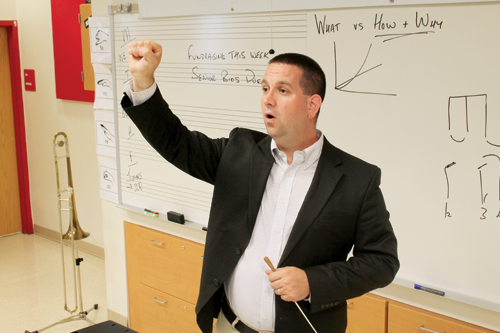
When did you know that you wanted to teach music?
It was pretty late compared to other music teachers. I hated music class in elementary school, but in middle school, I played in beginning band. I rented a horrible trombone and never intended to continue more than the two years needed to get middle school arts credits. My middle school band teacher inspired me and made me feel part of something. I agreed to play for another year. My teacher encouraged me to participate in marching band. I thought there was no way I was good enough and tried to quit three times. She never let me quit and always found a student to help.
How do you balance your family life and professional life?
Often not well, but I am working to improve. My wife is an amazing high school orchestra teacher. Because we are on the same page about why we teach, that makes it easier. It is what we love. We embrace the challenges together. In the last couple of years I joined a men’s group at church that helped me learn how I can serve with the gifts that I have. I try to be present with my family when I am home. The phone is off, the computer is away, and I get back to work after the girls are in bed.
I have discovered that success depends on patience and being in the right time and place. When I graduated from school, I applied for a job with a great high school program. I was a finalist but didn’t get the position. I was really disappointed at the time, but was offered the middle school job. Then I became a high school assistant before returning to North Hills to teach middle school. For the last five years I have taught high school where I was a student years ago. Getting passed over for that first high school job was one of the best things that ever happened to me. I wasn’t ready and did not understand all the job requires. I still don’t, but I know enough to do the best that I can every day. Learning from so many other people was a key step in my development.
How do you recruit and retain students?
The first step is to think about the vision for music in our district. We take an honest look at why a student would start on instrumental music and why they might quit down the line. We think about what we want students and parents to say about our program and what they really say. The questions are hard, but you need to understand the big picture before you develop recruiting strategies.
Recruiting in our community starts long before that one day when you sit down with students in elementary school, and retention goes on constantly. Every decision we make can improve or damage our relationship with the community. We have to make our programs relevant to students. Of course, we want students to have fun in music, but we really want it to be meaningful and worthwhile. That is something beyond fun.
We seek every opportunity to bring students together. Children are told what to do by adults all the time; that’s their life. When young students interact with an older student or a peer, that makes a big difference. We take our high school ensembles on tours of the elementary schools on a rotating basis. These assemblies take place on Halloween, Christmas, and Valentine’s Day, because those are party days in elementary school, so we are not interrupting the regular schedule. The assemblies are interactive and last an hour. We are just sharing music with them. At one point we bring our sixth grade students up to play with the high school band or orchestra for a piece. We have elementary school students conduct a piece. It means something to the younger elementary school students to see players who went to their school.
To retain students, you have to connect with them. In my second year of teaching, I started a new high school job, and thought I was doing great. At the end of the year I got out my roster and 16 out of the 60 students had decided to quit. I picked great music, taught them well, did all the things I was taught, but in the end, it wasn’t relevant to them. As well as I thought I did, I robbed them of several years of music education beyond the year I had them. We have to keep their musical interest. If the student drops, I have to view it as my fault. That keeps me up at night. If I place that blame elsewhere, I miss the opportunity to improve and reach more kids through music.
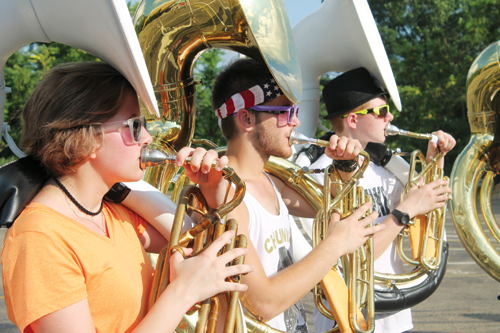
What warmup strategies do you employ with your students?
There are several parts of warming up that require planning. When students come in, we start to warm up. That’s physically getting the mechanism going. I really like using the Remington long tone exercises. At that point, depending on the level of the players, we focus on the start of the tone, getting a clear buzz on the mouthpiece or headjoint. We move on to intervals studies and lip slurs and eventually into chorales. At some point there is a shift from strictly warming up to skill development. That transition might be to work on a concept in one of our pieces or extending range. This is the most important part of our rehearsal, building our students as players each day.
To develop aural skills, we sing and play chorales. Singing was uncomfortable for me when I first started teaching, but it is extremely important. We work on chorales earlier in the warmup with the older students and might play a chorale for several weeks, learning it four or eight bars at a time. We will sing it, play one on a part, or play just the start of the note. Some people call it dutting, but I don’t like closing with the tongue, so I call it do-ing. We also identify the chords and harmonies.
What rehearsal atmosphere are you trying to create?
In the summer, we bring in seniors for about 45 minutes before each marching rehearsal begins. We talk about what we want the band to be like and how to teach various concepts. Over time, they develop a motto. We ask if everything we do lives up to that motto. The meeting with seniors sets the rehearsal atmosphere. We do not have any officers in the band because we don’t believe that leaders need titles. We have one drum major who is the focal point in rehearsals, but we want all seniors to be involved in the rehearsal. I challenge students to make rehearsals theirs, not the staff’s.
How do you balance concert band and marching in your program?
We integrate them as much as possible. Marching band at North Hills is voluntary, but our goal is to have one band program. We have the same rehearsal expectations wherever we are. We want to play in tune with a great tone in every ensemble. For marching band we talk about producing a concert sound on the field so there is no re-teaching when we come inside. It’s all band; there is no shifting gears. The marching band has grown from 120 five years ago to 210. This is the largest ensemble in the history of the school.
Marching band allows younger students to stand next to upperclassmen and learn how to play like them. It is the heart of our program. Our concert bands are better because of the time our marching band spends at band camp away in the woods, learning how to work together. We sing solfege outside and inside, play chords, and work together the same way. Both groups play a lot of music. We perform several halftime shows each year and the concert bands have at least three or four concerts a year.
How do you get students to practice?
That goes back to the vision of the band. Much of the work of making music is not very pleasant, like marching on asphalt in the hot sun. If I tell you that I want to create something special with the group that no one has ever done before, it sounds more exciting. The same is true with practicing. Some students love to do it. If you can explain how and why practicing is important, that we are trying to create something great together, students are much more willing to practice. It is less about the act than working together.
What advice would you give to people who are preparing for a career in instrumental music?
Take classes seriously; it is not something just to get through. Be professional in all that you do, because that is what is expected of you as an educator. Find ways to practice your craft through summer camps or local marching bands that need help. It is really important to put what you are learning into context. This fall we had a brand new music teacher who was a long-term substitute. She called me after getting the substitute job and asked to work with the marching band. I said that we did not have any positions open. She said, “I don’t want a position, I just want to help out and learn.” That really impressed me. She was at every rehearsal and made a great contribution. With such a strong attitude, she is going to do great things in the profession.
What advice do you have for working with parent groups?
Working with boosters is as important as anything we do as directors. Many directors feel like they have to put on their battle armor when working with parents, but they are a great part of the job. If you are new to a program or working to establish a booster organization, you need to start building a team. Parents can teach you a great deal about what the community values. Even if you find priorities that are out of balance, you learn where the group is and why. Then you can work with parents to plan the future course. The North Hills Instrumental Parents Association represents all groups from grades 4-12. It is not a fundraising group for the high school band. Its role is to aid and support. There are three main areas to help the program: logistics (fundraising and purchases), advocacy, and communication. I do not ask parents to do anything that I would not do myself. I attend every booster meeting. We remind ourselves often that we serve our kids by making the whole program great.
* * *
A Gift from the Class of 1982
The seniors of 1982 wrote ten principles to improve their band at the time. Each successive senior class has decided to keep them alive and has shared them with their band. The class of 1982 never intended them to endure, but they are still in use 35 years later. One of the things that makes them so valuable is that they came from students of generations past who have walked in their shoes. They are meant to be a baseline – the minimum students can expect from each other. They clear away the distractions and focus us on how we should be using our energy.
As a North Hills Band, we will . . .
1. be on time
2. warm up properly
3. tune carefully
4. be prepared
5. make positive contributions at all times
6. maintain the traditions of the band
7. have respect
8. be disciplined
9. be involved
10. be responsible
